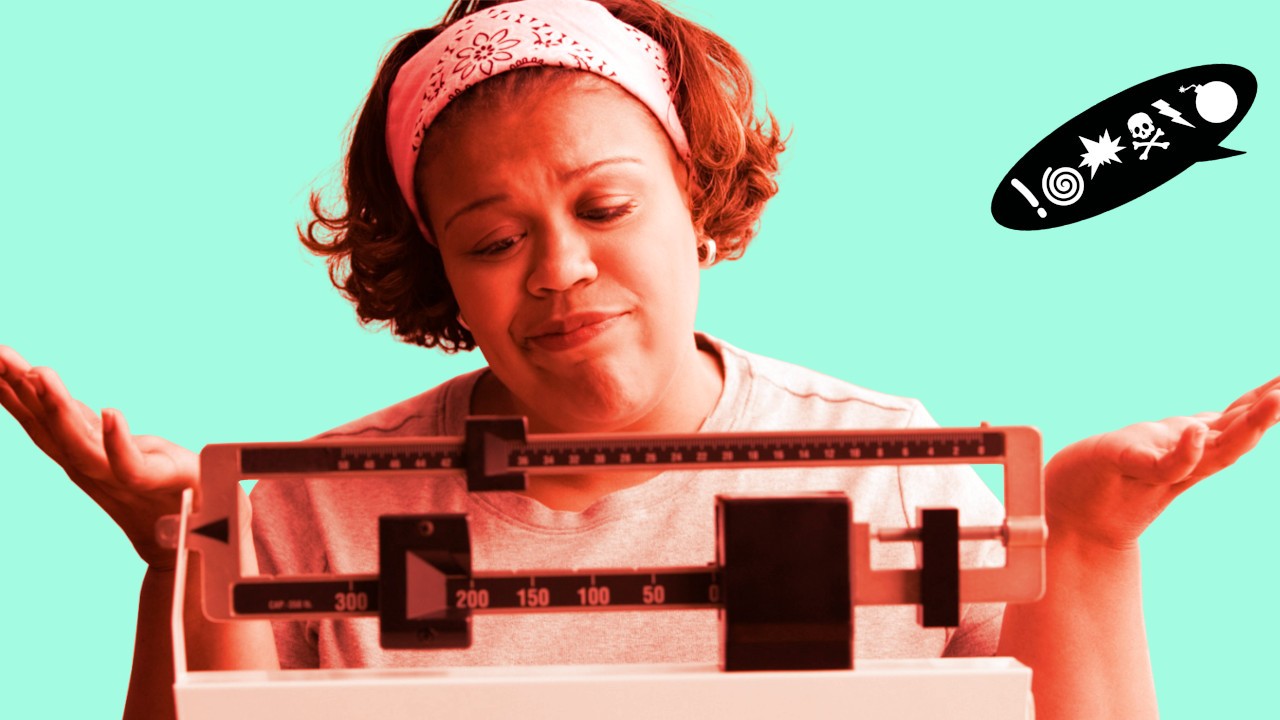When I met my husband, I was the thinnest I’d ever been in my adult life. At 5’2″ and 160lbs, I was still plump, but he thought I was beautiful.
I was sure I’d won the fat chick lottery: a man who didn’t equate “sexy” with “thin.” By the time we got married, I had re-gained 20 pounds, but it didn’t seem to faze him a bit.
Even so, I kept trying to lose weight. He was trying to shed a few pounds too, so we helped each other diet. My husband seemed to gain and lose the same 10 pounds every year, but mine always came back with a few extra friends.
After four years of marriage, I weighed 200 pounds. It was the size I’d been in high school when I felt like an unlovable fat girl, the size I’d promised myself I’d never be again. For a while, I redoubled my efforts to lose weight.
Around this time, I first stumbled upon the ideas of “fat acceptance” and “Health at Every Size (HAES).” They didn’t win me over right away. My whole life I’d believed that being fat was a failure, and that I could be thin and beautiful if I just tried hard enough. And here were people insisting that intentional weight loss hardly ever worked, but that you could be healthy and happy even if you were overweight.
The idea depressed me at first; it was crushing to realize that despite my best efforts, I was probably always going to be fat.
But the seed was planted. I started asking myself why being fat was really so terrible. My health was fine; I worked out regularly and my weight didn’t prevent me from doing activities I enjoyed; I had a husband who loved me. Maybe the struggle to be thin was causing me more pain than it was worth? Maybe learning to love my fat body was a smarter goal than losing weight?
I began forwarding articles about fat acceptance to my husband, sure that he would find them as interesting as I did.
He responded by sending me links to bodybuilding websites, and articles about which exercise methods would most likely help me lose weight.
This confused me. I tried to tease out exactly which parts of the fat acceptance movement we disagreed on. Was he unconvinced by studies that showed diets don’t work? Did he just think fat people were gross?
Did he think I was gross?
All this time I thought he’d found me beautiful, fat or thin, but suddenly I had to consider that he’d only tolerated my fatness because he knew I was trying my hardest to lose weight. While I’d been dreaming of being thin, he’d been dreaming too — of having a thin, conventionally beautiful wife.
But I realized that I couldn’t keep promising him — or myself — that I would ever be thin, even if I tried. Moreover, I didn’t think I should be obligated to keep trying.
It was a dilemma: I was a fat woman, and my husband now admitted that he found fat women unattractive.
I argued that what we consider attractive is influenced by society; he insisted that it was an innate preference for which he didn’t deserve to be judged. He felt like I was accusing him of being gullible and stupid, brainwashed by a culture that vilifies fatness.
He couldn’t understand why I would give up trying to be thin.
We started marriage counseling, and kept at it for years. (Some friends of mine who recently started counseling confided to me that it felt like it was taking too long after three months; I admit, I laughed a little!)
Divorce was a topic we avoided. We both just wanted to go back to the marriage we’d had: the happy, loving marriage that had been so easy for so many years. But we couldn’t agree on how to make that happen.
He thought the most sensible path would be for me to keep trying to lose weight. But by this time, even if I could magically lose 50 pounds, I wasn’t sure I wanted to stay married to someone with his opinions about fat people.
Emotionally exhausted and at an impasse, we finally decided to separate for a few months. It was a last-ditch effort: we didn’t know if it would make any difference, but we hoped it would at least give us a bit of a rest and some perspective.
I missed my husband. But I missed the husband who loved me no matter what, not the new anti-fat crusader he had changed into. But he felt the same way: he’d fallen in love with a plump-but-not-fat woman who wanted to be thin, and now he had a fat wife who’d “given up on herself.” And I had given up: given up on dieting, given up on the idea that my body needed to be fixed.
I already wished I hadn’t spent so many years beating myself up for being fat; I wasn’t going to stay in a marriage where my husband did it for me.
And then something surprising happened — he changed his mind. We met for dinner one night on our third month of separation, and his mood was better than I’d seen in years. He seemed happy to see me, and he talked about “when” I would come home, instead of “if.” He didn’t say a word about my weight.
I moved back in later that month.
Even now, nearly three years later, he has trouble explaining what changed. I guess coming that close to divorce made him really think about what he wanted in a partner, and at some point it must have sunk in that my fat was part of the package, not something that could (or should) be changed.
When I asked him about it again while writing this piece, he said he realized ours was a relationship he wouldn’t be able to replace — and that after all we went through, he “couldn’t remember why he wanted to.”
Sometimes people ask me if we’re “all better,” as if we could have just returned back to our just-married level of bliss. I’d say we’ve been happy more often than not, but it’s still a work in progress. We’ve both been converted to the “marriage takes work” way of thinking, instead of expecting our relationship to be effortless; our good days are pretty great, and the bad days are getting more rare.
We didn’t just magically start to agree when it comes to weight or body image issues, but these days we try to give each other the space and respect that I believe all people deserve to do what works for their own bodies. He still goes on diets, so meal planning can be a little tricky sometimes, but we’re learning to make it work. We both try to get plenty of exercise (he’s more into weightlifting; I like swimming), but we don’t really discuss our workouts or give each other advice in that arena.
In other words, just because we’re married doesn’t make us the boss of each other’s bodies. I’ve learned to love mine, and I won’t let anyone change that.
But there's more. Check out these bussin stories:
- It Happened To Me Love
 How pegging helps couples connect on a deeper and more intimate level It was a little scary at first, but I surprised myself with how much I enjoyed it, watching his face flush and respond to my thrusting movements.
How pegging helps couples connect on a deeper and more intimate level It was a little scary at first, but I surprised myself with how much I enjoyed it, watching his face flush and respond to my thrusting movements. - Food / Drink Health
 10 powerful anti-inflammatory herbs you didn’t know you have in your kitchen right now Never use healthy eating in place of real medications from a real doctor. With that said: we all pack anti-inflammatory magic in our cupboards. Here's the science.
10 powerful anti-inflammatory herbs you didn’t know you have in your kitchen right now Never use healthy eating in place of real medications from a real doctor. With that said: we all pack anti-inflammatory magic in our cupboards. Here's the science. - Love
 How to Feng Shui your bedroom to attract hot men Bring in the love of your life, welcome some sizzling romance, or add spark to your current relationship.
How to Feng Shui your bedroom to attract hot men Bring in the love of your life, welcome some sizzling romance, or add spark to your current relationship.


